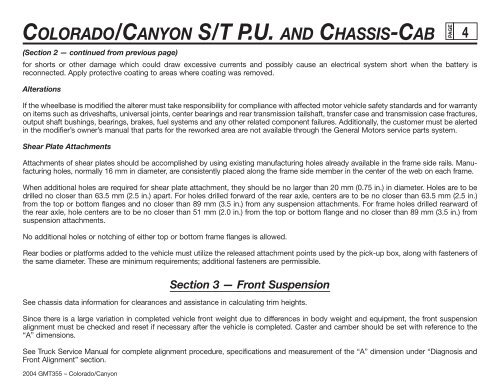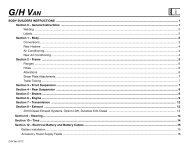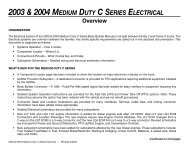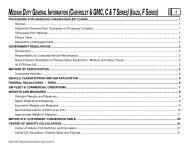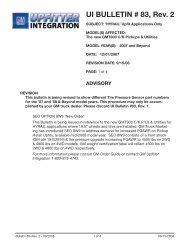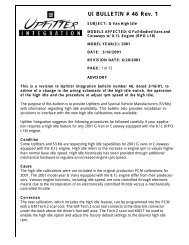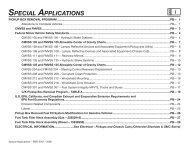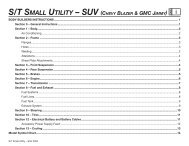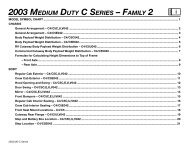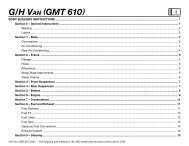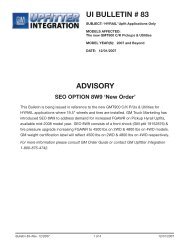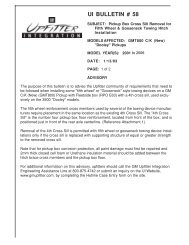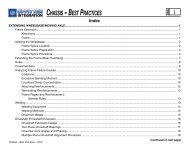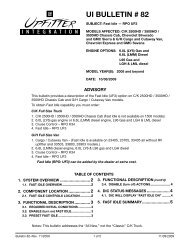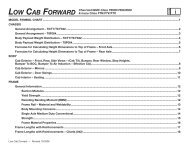colorado/canyon s/t pu and chassis-cab 43 - GM UPFITTER
colorado/canyon s/t pu and chassis-cab 43 - GM UPFITTER
colorado/canyon s/t pu and chassis-cab 43 - GM UPFITTER
Create successful ePaper yourself
Turn your PDF publications into a flip-book with our unique Google optimized e-Paper software.
Colorado/Canyon S/T P.U. <strong>and</strong> Chassis-Cab<br />
(Section 2 — continued from previous page)<br />
for shorts or other damage which could draw excessive currents <strong>and</strong> possibly cause an electrical system short when the battery is<br />
reconnected. Apply protective coating to areas where coating was removed.<br />
Alterations<br />
If the wheelbase is modified the alterer must take responsibility for compliance with affected motor vehicle safety st<strong>and</strong>ards <strong>and</strong> for warranty<br />
on items such as driveshafts, universal joints, center bearings <strong>and</strong> rear transmission tailshaft, transfer case <strong>and</strong> transmission case fractures,<br />
out<strong>pu</strong>t shaft bushings, bearings, brakes, fuel systems <strong>and</strong> any other related component failures. Additionally, the customer must be alerted<br />
in the modifier’s owner’s manual that parts for the reworked area are not available through the General Motors service parts system.<br />
Shear Plate Attachments<br />
Attachments of shear plates should be accomplished by using existing manufacturing holes already available in the frame side rails. Manufacturing<br />
holes, normally 16 mm in diameter, are consistently placed along the frame side member in the center of the web on each frame.<br />
When additional holes are required for shear plate attachment, they should be no larger than 20 mm (0.75 in.) in diameter. Holes are to be<br />
drilled no closer than 63.5 mm (2.5 in.) apart. For holes drilled forward of the rear axle, centers are to be no closer than 63.5 mm (2.5 in.)<br />
from the top or bottom flanges <strong>and</strong> no closer than 89 mm (3.5 in.) from any suspension attachments. For frame holes drilled rearward of<br />
the rear axle, hole centers are to be no closer than 51 mm (2.0 in.) from the top or bottom flange <strong>and</strong> no closer than 89 mm (3.5 in.) from<br />
suspension attachments.<br />
No additional holes or notching of either top or bottom frame flanges is allowed.<br />
Rear bodies or platforms added to the vehicle must utilize the released attachment points used by the pick-up box, along with fasteners of<br />
the same diameter. These are minimum requirements; additional fasteners are permissible.<br />
Section 3 — Front Suspension<br />
See <strong>chassis</strong> data information for clearances <strong>and</strong> assistance in calculating trim heights.<br />
Since there is a large variation in completed vehicle front weight due to differences in body weight <strong>and</strong> equipment, the front suspension<br />
alignment must be checked <strong>and</strong> reset if necessary after the vehicle is completed. Caster <strong>and</strong> camber should be set with reference to the<br />
“A” dimensions.<br />
See Truck Service Manual for complete alignment procedure, specifications <strong>and</strong> measurement of the “A” dimension under “Diagnosis <strong>and</strong><br />
Front Alignment” section.<br />
2004 <strong>GM</strong>T355 – Colorado/Canyon<br />
PAGE


